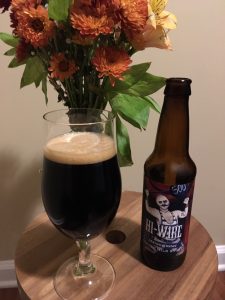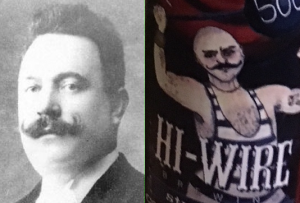Julius Fučík is your favorite composer you’ve never heard of. You know his most famous piece; you could even hum along if you heard it on the radio. But you probably didn’t know his name (which is pronounced “Foo-chick”) until you just read it.
We just learned Fučík’s name. We found it when we searched the Internet for a piece to accompany our latest acquisition from the local beer store—Hi-Wire Brewing’s Strongman Coffee Milk Stout.

Paste magazine recently conducted a blind taste test and named Strongman the 5th-best stout under 8% ABV. The magazine described Strongman as “intensely roasty” and said the beer “wears its exuberance on its sleeve, with a fantastic aroma of concentrated, sweetened espresso and milk froth.” In other words, “If coffee’s what you want, that’s what this one delivers.”
Fučík matches the big-top art concept of the Strongman stout not only in style but also in substance. Fučík’s music has been accompanying high wires for decades. His most famous piece, “Einzug der Gladiatoren (Entrance of the Gladiators),” has been the soundtrack for live and televised circus performances the world over.
Fučík doesn’t just share circus sensibilities with the Hi-Wire stout. He is practically a doppelganger of the Strongman in the beer-label art. Look at that moustache!

The German website Klassika describes Fučík’s life. Fučík was born in Prague in 1872. There he studied bassoon, violin, and drums. He also studied composition under Antonín Dvořák.
Fučík served in the military from 1891 to 1895. Two years later, he became a military band leader. As befits a band leader, Fučík specialized in marches. Fučík wrote over 400 pieces in his life, including chamber music, songs, and a Requiem. But his pieces in the march style, including “Entrance of the Gladiators” and “Florentine March,” are the most popular with modern listeners and ensembles.
Stouts, especially Hi-Wire’s Strongman, are like marches. Both the beer and the music are bold yet sweet.
Marches’ boldness comes from their practical purpose. Marches propel band members’ synchronized steps down the street, so they feature straightforward, consistent rhythms on percussion instruments such as snare drum and cymbal. They also entertain crowds at parades and public gatherings, so they project their melodies through the loud voices of brass instruments.
Stouts’ boldness comes from the malt. A traditional stout is brewed with roasted barley. The roasted grain evokes sensations reminiscent of roasted beans: stouts often have flavors of espresso and chocolate, and they typically have the inky color of a cup of black coffee. This flavor similarity leads some brewers to add coffee to their stouts. Hi-Wire, for example, adds Dynamite Roasting Co.’s coffee to Strongman after fermentation.
Although bold, marches and stouts typically retain notes of sweetness. Marches usually have a quiet, lyrical melody in the middle that repeats on full blast at the end. Stouts often have sweet flavors of caramel, molasses, or raisins. And milk stouts such as Strongman have extra sweetness from the lactose that is added during brewing.
We’ll close with a Fučík march that, like Hi-Wire’s beer, is a tribute to the American South. Listen for the sweetness and the boldness in Fučík’s “Mississippi River,” and share your favorite marches and stouts with us in the comments below.